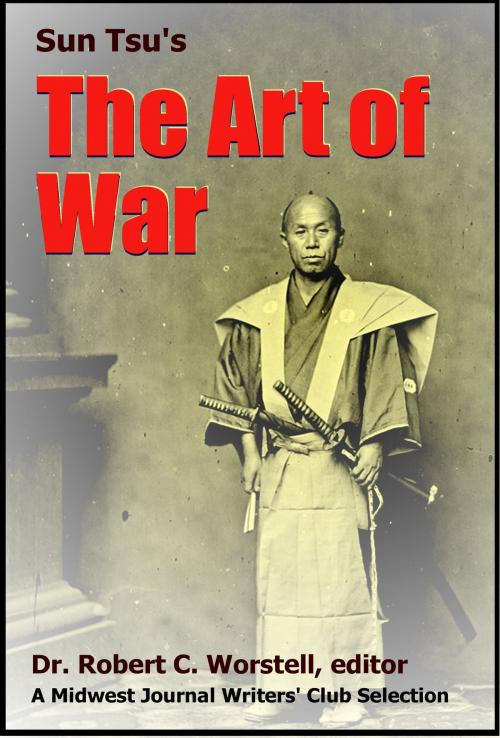Sun Tzu's Art of War
A Midwest Journal Writers Club Selection
Nonfiction, Religion & Spirituality, Philosophy, Zen, Eastern, Social & Cultural Studies, Political Science, Government| Author: | Midwest Journal Writers' Club, Dr. Robert C. Worstell, Sun Tzu | ISBN: | 9781304240439 |
| Publisher: | Midwest Journal Press | Publication: | July 17, 2013 |
| Imprint: | Language: | English |
| Author: | Midwest Journal Writers' Club, Dr. Robert C. Worstell, Sun Tzu |
| ISBN: | 9781304240439 |
| Publisher: | Midwest Journal Press |
| Publication: | July 17, 2013 |
| Imprint: | |
| Language: | English |
About this book: The Art of War is an ancient Chinese military treatise attributed to Sun Tzu, a high-ranking military general, strategist and tactician. The text is composed of 13 chapters, each of which is devoted to one aspect of warfare. It is commonly known to be the definitive work on military strategy and tactics of its time. It has been the most famous and influential of China's Seven Military Classics, and "for the last two thousand years it remained the most important military treatise in Asia, where even the common people knew it by name." It has had an influence on Eastern and Western military thinking, business tactics, legal strategy and beyond.
The book was first translated into the French language in 1772 by French Jesuit Jean Joseph Marie Amiot and a partial translation into English was attempted by British officer Everard Ferguson Calthrop in 1905. The first annotated English language translation was completed and published by Lionel Giles in 1910.[2] Leaders as diverse as Mao Zedong, General Vo Nguyen Giap, Baron Antoine-Henri Jomini, General Douglas MacArthur and leaders of Imperial Japan have drawn inspiration from the work.
Sun Tzu considered war as a necessary evil that must be avoided whenever possible. The war should be fought swiftly to avoid economic losses: "No long war ever profited any country: 100 victories in 100 battles is simply ridiculous. Anyone who excels in defeating his enemies triumphs before his enemy's threats become real". According to the book, one must avoid massacres and atrocities because this can provoke resistance and possibly allow an enemy to turn the war in his favor.[3] For the victor, "the best policy is to capture the state intact; it should be destroyed only if no other options are available".
Sun Tzu emphasized the importance of positioning in military strategy. The decision to position an army must be based on both objective conditions in the physical environment and the subjective beliefs of other, competitive actors in that environment. He thought that strategy was not planning in the sense of working through an established list, but rather that it requires quick and appropriate responses to changing conditions. Planning works in a controlled environment; but in a changing environment, competing plans collide, creating unexpected situations. (source: Wikipedia)
About the author: Sun Tzu was an ancient Chinese military general, strategist, and philosopher from the Zhou Dynasty. He is traditionally believed to be the author of The Art of War, an extremely influential ancient Chinese book on military strategy. Sun Tzu has had a significant impact on Chinese and Asian history and culture, both as an author of The Art of War as well as through legend.
During the nineteenth and twentieth centuries, Sun Tzu's The Art of War grew in popularity and saw practical use in Western society. His work continues to influence both Asian and Western culture, politics, business, and sports. (source: Wikipedia)
About the Midwest Journal Writers' Club: This was created by popular request to enable any beginning or established author to improve their skills by studying quality editions of classic bestselling fiction. Join at http://midwestjournalpress.com
About this book: The Art of War is an ancient Chinese military treatise attributed to Sun Tzu, a high-ranking military general, strategist and tactician. The text is composed of 13 chapters, each of which is devoted to one aspect of warfare. It is commonly known to be the definitive work on military strategy and tactics of its time. It has been the most famous and influential of China's Seven Military Classics, and "for the last two thousand years it remained the most important military treatise in Asia, where even the common people knew it by name." It has had an influence on Eastern and Western military thinking, business tactics, legal strategy and beyond.
The book was first translated into the French language in 1772 by French Jesuit Jean Joseph Marie Amiot and a partial translation into English was attempted by British officer Everard Ferguson Calthrop in 1905. The first annotated English language translation was completed and published by Lionel Giles in 1910.[2] Leaders as diverse as Mao Zedong, General Vo Nguyen Giap, Baron Antoine-Henri Jomini, General Douglas MacArthur and leaders of Imperial Japan have drawn inspiration from the work.
Sun Tzu considered war as a necessary evil that must be avoided whenever possible. The war should be fought swiftly to avoid economic losses: "No long war ever profited any country: 100 victories in 100 battles is simply ridiculous. Anyone who excels in defeating his enemies triumphs before his enemy's threats become real". According to the book, one must avoid massacres and atrocities because this can provoke resistance and possibly allow an enemy to turn the war in his favor.[3] For the victor, "the best policy is to capture the state intact; it should be destroyed only if no other options are available".
Sun Tzu emphasized the importance of positioning in military strategy. The decision to position an army must be based on both objective conditions in the physical environment and the subjective beliefs of other, competitive actors in that environment. He thought that strategy was not planning in the sense of working through an established list, but rather that it requires quick and appropriate responses to changing conditions. Planning works in a controlled environment; but in a changing environment, competing plans collide, creating unexpected situations. (source: Wikipedia)
About the author: Sun Tzu was an ancient Chinese military general, strategist, and philosopher from the Zhou Dynasty. He is traditionally believed to be the author of The Art of War, an extremely influential ancient Chinese book on military strategy. Sun Tzu has had a significant impact on Chinese and Asian history and culture, both as an author of The Art of War as well as through legend.
During the nineteenth and twentieth centuries, Sun Tzu's The Art of War grew in popularity and saw practical use in Western society. His work continues to influence both Asian and Western culture, politics, business, and sports. (source: Wikipedia)
About the Midwest Journal Writers' Club: This was created by popular request to enable any beginning or established author to improve their skills by studying quality editions of classic bestselling fiction. Join at http://midwestjournalpress.com















